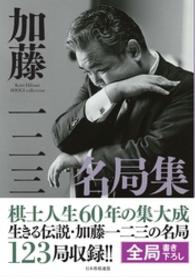- ホーム
- > 洋書
- > 英文書
- > Philosophy
Full Description
This collection of 15 essays looks critically at how Deleuze challenges architecture as a discipline, how architecture contributes to philosophy and how we can come to understand the complex politics of space of our increasingly networked world. The contributors are a team of international, interdisciplinary contributors, with essays from John Rajchman, Elizabeth Grosz and Brian Massumi. Since the 1980s, Deleuze's philosophy has fuelled a generation of architectural thinking, and can be seen in the design of a global range of contemporary built environments. His work has also alerted architecture to crucial ecological, political and social problems that the discipline needs to reconcile.
Contents
Acknowledgements; Introduction: Exhaustion and the Exhausted: Deleuze AND Architecture, Hélène Frichot and Stephen Loo; Part I: Siting; 1. Becomings: Architecture, Feminism, Deleuze, before and after the Fold, Karen Burns; 2. Northern Line, Deborah Hauptmann and Andrej Radman; 3. Why Deleuze, Why Architecture, Marko Jobst; Part II: Constructing; 4. Deleuze and the Story of the Superfold, Hélène Frichot; 5. Objectile: The Pursuit of Philosophy by Other Means? Bernard Cache; 6. The Architect as Metallurgist: Using Concrete to Trace Bio-Digital Lines, Mike Hale; 7. Assembling Architecture, Kim Dovey; Part III: Gathering; 8. Toward a Theory of the Architectural Subject, Simone Brott; 9. The Holey City: Walking along Istanbul's Theodosian Landwalls, Catharina Gabrielsson; 10. Deleuze, Architecture and Social Fabrication, Andrew Ballantyne; 11. Politics + Deleuze + Guattari + Architecture, Adrian Parr; Part IV: Caring; 12. The Ethological City, Cameron Duff; 13. Architectures, Critical and Clinical, Chris L. Smith; 14. Abstract Care, Stephen Loo; 15. Making a Rhizome or Architecture After Deleuze and Guattari, Doina Petrescu, Anne Querrien, Constantin Petcou; Notes on Contributors; Index.








